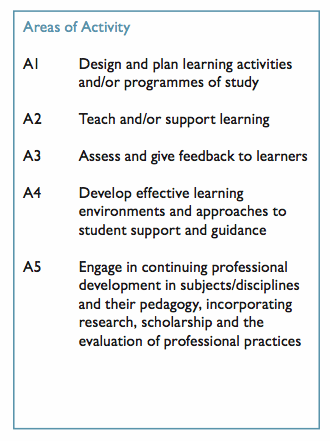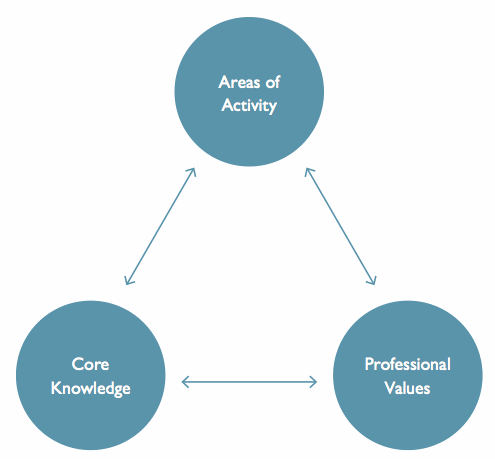This Friday is the first of my five on-campus sessions for my course at Pace University,
NURS 840: Teaching and Learning in Advanced Practice Nursing, so there is no better time than the present to further develop the COWIL (Consider the Opposite of What I Like) model I started to develop in my post yesterday (
Reflective Teaching and Learning via COWIL). I really appreciate this consideration opportunity as part of the
First Steps into Learning and Teaching in Higher Education mooc.
 I have chosen to focus on the Areas of Activity Dimension of the Framework as part of my reflective practice:
I have chosen to focus on the Areas of Activity Dimension of the Framework as part of my reflective practice:
- A1 Design and plan learning activities and/or programmes of study
- A2 Teach and/or support learning
- A3 Assess and give feedback to learners
- A4 Develop effective learning environments and approaches to student support and guidance
- A5 Engage in continuing professional development in subjects/disciplines and their pedagogy, incorporating research, scholarship and the evaluation of professional practices
When I planned to use actor-network theory (ANT) in this reflective exercise, it was due in part to its focus on treating “everything in the social and natural worlds as a continuously generated effect of the webs of relations within which they are located” (pg. 1). In other words, thinking about my first on-campus session, we will all be there in a network of all our experiences, held in place at that time with all our technologies, artifacts, perspectives, likes and dislikes, etc.
What does that mean for my own preparation, especially in relationship to these Areas of Activity? Choosing only one of them to consider right now, such as “A3 Develop effective learning environments and approaches to student support and guidance,” I will now apply COWIL, which begins with my thinking about what I like.
Let’s see, in a class of adult learner degree students, I like discussion, open ended questions, answers that are not closed or limited, more questions than answers, and a certain discomfort in pushing new ideas. What don’t I like? Lecture, pretending to give all the answers, and students not reading the texts and preparing for the discussion ahead of time.
Hmm, ANT would also remind me about the other factors that will combine into Friday’s 3-hour class session, such as the food that will be provided, the room set-up, computer and other technologies in the room, unspoken student expectation, biases against the course topical area, questions about my own background, concerns about tuition payments, the air conditioning, etc.
What am I doing here? In considering how I will normally prepare for my class (the content, objectives, clarifications over assignments, and the like), it is easy to assume (or simply not even notice) the effect all these other factors bring to the room and help maintain the interaction of the experience together. How can I consider and give voice and experience to some of these other factors if I am going to focus on the effective learning environments and approaches to student support and guidance? Perhaps I can use a brief YouTube video or chart for some of the content (neither of which I want to do, but both of them may help learners capture some of the sense of the material and experience I want them to have). Perhaps we can address the food and air conditioning to see if they meet the needs? The room set-up can accommodate changing the tables and seats (as I just learned) if we change the classroom (something else I just learned is possible). While I don’t like lecture, perhaps I can model some of the way my own thinking has developed over my years of study of this content, something that will allow the content to be discussed without lecture (these are all bright DNP students; they can read and do not need lecture on this topic).
These are some of the things I am considering regarding the learning environment and approach to my first on-campus class in this blended course. I hope that including elements of the opposite of what I want (COWIL), along with some of the non-human elements of the expected learning (ANT) will help all of us in the course have a more engaging and open-ended experience that promotes more personal and critical learning.
 I read a fascinating article on knowledge sharing and co-creation, and think it is quite timely for #5Papers:
I read a fascinating article on knowledge sharing and co-creation, and think it is quite timely for #5Papers:
 As I am putting the final tweaks in my preparation for my 3-hour on-campus session of my Pace University course,
As I am putting the final tweaks in my preparation for my 3-hour on-campus session of my Pace University course, 

